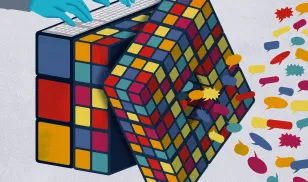


Kazakhstan
In Kazakhstan, parliamentary and presidential elections are neither free nor fair. The dominant media outlets are either in state hands or owned by government-friendly businessmen. Freedoms of speech and assembly remain restricted and punished, and corruption is endemic.
Research & Recommendations
Kazakhstan
| PR Political Rights | 5 40 |
| CL Civil Liberties | 18 60 |
Overview
President Nursultan Nazarbayev ruled Kazakhstan from 1990 until his resignation in 2019. His hand-picked successor, Kassym-Jomart Tokayev, began a program of ostensible reform after peaceful nationwide protests turned violent in January 2022. Parliamentary and presidential elections are neither free nor fair, however, and authorities have consistently marginalized or imprisoned genuine opposition figures. The dominant media outlets are either in state hands or owned by government-friendly businessmen. Freedoms of speech and assembly remain restricted and subject to punishment, and corruption is endemic.
In countries where democratic forces have come to power after periods of antidemocratic rule, the new governments should pursue an agenda that protects and expands freedoms even as it delivers tangible economic and social benefits to citizens.
These countries must act swiftly to release all political prisoners, build or revitalize democratic institutions, reform police and other security forces, organize and hold competitive multiparty elections, and ensure accountability for past human rights violations.
In countries where there has been significant erosion of political rights and civil liberties, policymakers, legislators, jurists, civic activists, and donor communities should work to strengthen institutional guardrails and norms that serve to constrain elected leaders with antidemocratic or illiberal aims.
Kazakhstan
| A Obstacles to Access | 14 25 |
| B Limits on Content | 12 35 |
| C Violations of User Rights | 11 40 |
Political Overview
President Nursultan Nazarbayev ruled Kazakhstan from 1990 until his resignation in 2019. His hand-picked successor, Kassym-Jomart Tokayev, began a program of ostensible reform after peaceful nationwide protests turned violent in January 2022. Parliamentary and presidential elections are neither free nor fair, however, and authorities have consistently marginalized or imprisoned genuine opposition figures. The dominant media outlets are either in state hands or owned by government-friendly businessmen. Freedoms of speech and assembly remain restricted and subject to punishment, and corruption is endemic.
Freedom of expression online has been and is increasingly under attack as governments shut off internet connectivity, block social media platforms, and restrict access to websites that host political, social, and religious speech. Protecting freedom of expression will require strong legal and regulatory safeguards for digital communications.
Governments should encourage a whole-of-society approach to fostering a high-quality, diverse, and trustworthy information space. The Global Declaration on Information Integrity Online identifies best practices for safeguarding the information ecosystem, to which governments should adhere.
Comprehensive data-protection regulations and industry policies on data protection are essential for upholding privacy and combating disproportionate government surveillance, but they require careful crafting to ensure that they do not contribute to internet fragmentation—the siloing of the global internet into nation-based segments—and cannot be used by governments to undermine privacy and other fundamental freedoms.
Kazakhstan
| DEMOCRACY-PERCENTAGE Democracy Percentage | 4.76 100 |
| DEMOCRACY-SCORE Democracy Score | 1.29 7 |
Executive Summary
Following snap presidential elections in November 2022, President Kassym-Jomart Tokayev secured another seven years in office and focused on stabilizing the political and socioeconomic situation in Kazakhstan. President Tokayev faces many domestic and foreign policy challenges. It is important for Tokayev to maintain the loyalty of political and business elites who were previously aligned with former president Nursultan Nazarbayev. President Tokayev adopted a cautious approach to key personnel decisions by maintaining a balance between his own appointees and Nazarbayev allies who retained their posts under the new president. Surrounding himself with trusted people remains a challenging task for Tokayev. Patronage is deeply rooted in public administration, with key figures across the government closely connected through family and personal networks.
The future of European democracy and security is now inextricably linked to the fate of Ukraine. European Union (EU) and NATO member states must not only invest far more—and more efficiently—in their collective defense, but also provide Ukraine with the assistance it needs to roll back Russian advances and build a durable democracy of its own.
In addition to defending the international order from emboldened autocrats, democratic governments must attend to democratic renewal within Europe, particularly among nascent democracies.
Military aggression from autocracies in the region has underscored the dangers of exclusion from democracy-based organizations like the EU and NATO, galvanizing the political will of policymakers in aspiring member states and generating further public pressure to undertake long-sought democratic reforms.



